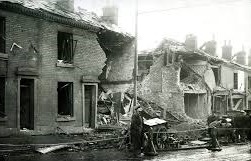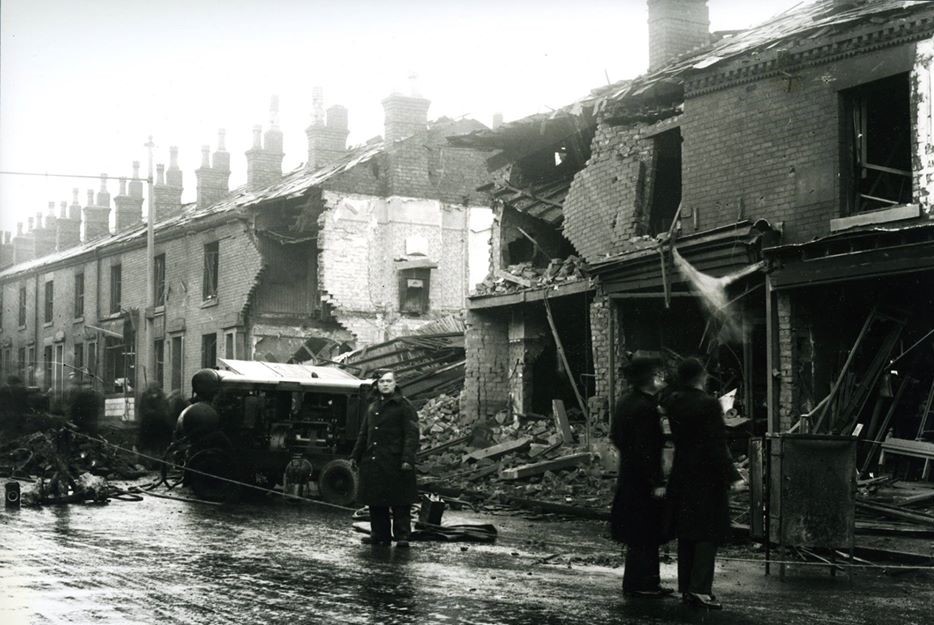World War II Bombs drop on Rochdale

Ferocious German bombing of the United Kingdom took place by day in 1940 but increasingly by night from October of that year. London took a great deal of the bombing but port cities such as Liverpool, Bristol, Cardiff, Southampton, Belfast, and Glasgow were also attacked. One objective of German raids was to try to negatively influence the morale of the people, but this did not happen and only served to galvanise the population. A further and more practical objective was to cripple the British armaments industry but one effect of the raids was to disperse the armament centres, particularly aircraft factories from the main towns and cities to smaller, less obvious ones. However, heavy industry remained a target and that included the Midlands and the North of England.

In the summer of 1940 Manchester was particularly badly hit. The Palace Theatre, Manchester Cathedral, the Royal Exchange and the Free Trade Hall all experienced damage and just before Christmas. 684 people were killed over a two night period in which 272 tons of high explosives were dropped along with 2000 incendiary bombs. It became known as the Christmas Blitz. Oxford Road and Deansgate were blocked by debris and unexploded bombs and 8000 homes were destroyed. Salford and Stretford also sustained casualties and fatalities and hundreds of properties were lost in the raids. Middleton, where the Avro factory built the Lancaster bomber was hit, evidently without casualties and only putting the canteen out of commission !
Although the glow of fires in Manchester could be seen from the hills around Rochdale, the town itself escaped the worst of the bombing. This was perhaps due to a failure of military intelligence on the part of the Germans as plenty of munitions were being manufactured in Rochdale at the time. Bombs (especially mortar bombs) and shells for example, were being filled at a factory in Healey Dell with chemists and engineers working there throughout the war. Eunice Hutt (see https://www.bbc.co.uk/history/ww2peopleswar/stories/32/a6623732.shtml) records that they worked in a big shed on an assembly line, the workers ‘sitting on either side of a long table and each did a bit of everything towards making the bombs. We changed places every shift so that the job didn’t become too monotonous. The explosives were put in at the very end. There was once an explosion but fortunately nobody was injured.’ Pillboxes still stand in Healey Dell ready, if needed, to repulse any attacks that might have followed an invasion. The fact that they were not needed was testament to the war effort.
There are many stories from World War II some of which might explain, if true, why Rochdale was bombed so lightly given that it was on the flight path to and from Liverpool. The story goes that Adolf Hitler admired Rochdale Town Hall and its stained-glass windows so much that he gave orders not to have the town bombed, intending to dismantle the building at some point and take it back to Germany. Whether this is true or not will never be known but the only bombs to fall on the town were four in total although there are records of a doodle-bug passing over the town and coming to earth on an estate in Oldham.
The most clearly recorded bombing in the town was on the night of the 9th January 1941 when bombs fell on the Sudden area. The Rochdale Observer reported that ‘The blast from two high explosive bombs dropped on the town early today, wrecked shops and offices and shattered windows of property – including a school – over a considerable stretch of roadway and adjoining streets. There was, however, only one fatal casualty, a Mrs Rossiter.’ Six other people were injured in the raid and houses in the area around what is now Brimrod County Primary School suffered broken windows. The water mains were blown from the ground and Finsbury Street and Holborn Street, some reports suggest, were covered in broken glass which the residents set to and swept up !
Other bombs dropped around the town were at Bellfield in August 1940, on Norden in October 1942 and near a row of houses at Red Lumb. There have always been stories that a bomb dropped near Firgrove and that it went straight into the canal although how authentic these stories are is unknown. Compared to many towns in the north of England Rochdale got off lightly.